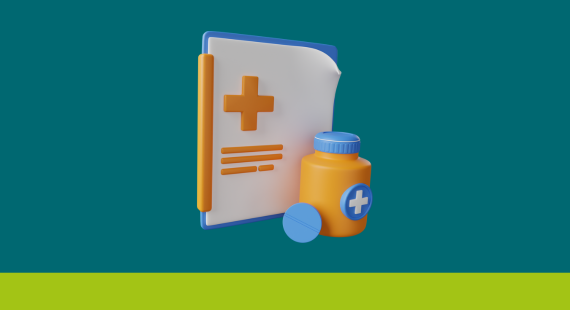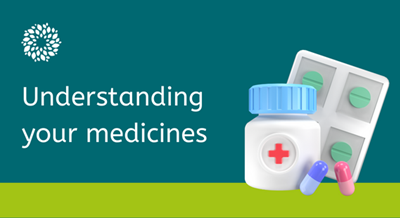
If you are experiencing a mental health difficulty, making decisions around medication may be something that comes up as part of your recovery journey.
Having knowledge about mental health medication and feeling empowered to make the right choices for you is important.
Here, Ciara Ni Dhubhlaing, Chief Pharmacist here in St Patrick's Mental Health Services, shares some useful information and tips on how to make a decision about starting medication. She discusses this further in a talk from our family information series, which you can also find below.
Why you might take medication
There are a number of reasons why you might take medication for your mental health, including:
- Treating an illness
- Improving specific symptoms
- Preventing relapse, especially in long-term difficulties or where there is a higher risk
- Improving overall quality of life
- Benefitting from general positive side-effects (such as getting on better with family and friends, feeling more motivated, or finding day-to-day life easier).
Most mental health medicines are focused on improving symptoms, rather than treating a specific difficulty or illness.
What factors to consider in choosing medication
It’s important to get the right medication for you.
Sometimes, you might start a particular medication that doesn’t suit you and come to think that no type of that medication would suit you. However, there are lots of different options available to you.
It is worth noting that sometimes your perspective around what you want from your medication can be different to that of the prescriber. For prescribers, the most important thing tends to be the suitability and safety of the medication; for the person taking it, the most important thing tends to be whether the medication is going to work effectively. It’s helpful, therefore, to be aware that a number of factors have to considered in the choice of medication.
These factors include:
- the side effects of the medication, and its tolerability (to what degree you can tolerate the medication’s side effects)
- the risks of not taking the medication; for example, if you have suicidal thoughts or risky behaviours when you are unfeeling unwell, the risks of not taking the medication may be higher than taking it, even if there are side effects
- previous treatments, as understanding what has worked for you and what hasn’t worked for you in the past can help to identify what could work for you now
- how severe your symptoms are, as this can influence the dosage of the medication that might work best for you
- cost: some medicines are available on the medical card or payment schemes, while others aren’t
- individual factors, such as whether you have other illnesses or health-related conditions, such as pregnancy, or other circumstances which need to be considered.
What your prescriber should know
Your prescriber needs to know:
- your complete medical history
- other medical issues you have, such as heart problems
- other medications you are taking, including:
- inhalers, drops, sprays, creams, injections, contraceptives and so on
- over-the-counter medications (like medicines for headache or constipation)
- herbal remedies or “natural” products
- other substances including illegal drugs
- Other individual concerns or future plans that might be relevant, such as planning to emigrate or trying to get pregnant.
How to make decisions about your medication
Taking steps to get the information you need and to understand what’s important to you and your recovery can help you in making decisions about your medication. This can be something you might like to have support from family or friends with as well.
It can be helpful to think of “SAFER meds” and to use the five “SAFER” steps below when you are preparing for a consultation with your prescriber or making decisions about your mental health medicines.
Say what you need
Make the prescriber aware of what information you need and what is important to you about your medication.
Think about whether:
- you have enough information about the medication
- the information has been provided to you in the way that suits you best
- you know the options available to you, and the risks and benefits of them
- you are clear about what risks and benefits are most important to you.
Feel free to ask if someone can come in with you to a consultation with your prescriber if you would find that helpful.
Ask questions
Some questions that are good to ask your prescriber include:
- How soon will I notice an effect?
- What are the common side effects?
- Are there other, serious side effects I should be aware of?
- How should I manage the side effects?
- How might the medication affect my lifestyle?
- How often will the medication be reviewed?
- How long before a change will be considered if my medication is not working?
Find the facts
For finding information about mental health medication, the Choice and Medication website is a very useful place. It has information on different mental health medicines; information about medication use in pregnancy and breastfeeding; a series on managing common side effects; what to consider when coming off medication; and more.
If you are receiving mental healthcare, you have the option of talking to your doctor, nurse, multidisciplinary team (MDT), or pharmacist. Community pharmacists are very helpful, but, as they do not specialise in mental health, they may need some additional time to get the right information for you.
Patient information leaflets are readily available online. The Health Products Regulatory Authority is the national medicines authority for Ireland, and information on all medicines available in Ireland can be found on its website.
Do think about who or where you are going to, what their knowledge base is, and whether there are any bias or experiences which might affect the information you get. For instance, you might find it helpful to talk to other people who have used a particular medicine and who can share their experience of taking it. Just bear in mind that people might have positive or negative thoughts of their own about a medicine for different reasons, and that what suits one person might not suit another. Consulting a range of sources and seeking unbiased information when you are gathering knowledge is extremely useful.
Evaluate your decision
You are the expert!
You are the only person who knows how your condition and treatment affects you. Your treatment and recovery journey is unique to you, so it’s essential to understand the role that medicines might play in that. For example, for some people, medicine might be a small part of their recovery: it can be something to help them feel more comfortable or stable while they take part in talking therapies or other supports. For others, medication might play a larger role.
Weigh up the risks and benefits to yourself and talk these through with your doctor or prescriber. Doing this and making the decisions together will give the best chance for them to be the right decisions for you.
Report back
Reporting back on your experience to your pharmacist, prescriber or MDT is really important.
Pay attention to how you feel: discuss with them how you were feeling with the medication versus how you felt without it.
Let them know if you are having any side effects from the medication.
Inform them if you haven’t taken the medication. It can happen that medicines are changed or dosages increased if it is thought a medication isn’t working when, in fact, the person hasn’t actually taken it. Sometimes, the person just hasn’t been comfortable to say this, but being as honest as you can be is the most helpful thing for your recovery. In other cases, the person may have forgotten to take their medicine and a family member or carers might notice and bring it to attention of the MDT before they do.
Discuss whether you want to continue the medication also. It’s possible to swap and change medication if it doesn’t suit you. Don’t feel that you are “locked in” to a decision to take medication; you can change your mind at any point.
As healthcare workers, we are privileged to walk with you on your journey to recovery; let’s keep the conversation going on that journey!
Watch a talk with Ciara on medication
Continue to…
Meet our Team: Human Resources Administrator

